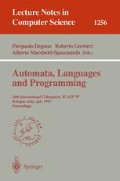Abstract
We present a PCF-like calculus having real numbers as a basic data type. The calculus is defined by its denotational semantics. We prove the universality of the calculus (i.e. every computable element is definable). We address the general problem of providing an operational semantics to calculi for the real numbers. We present a possible solution based on a new representation for the real numbers.
Work partially supported by an EPSRC grant: “Techniques of Real Number Computation” at Imperial College of Science, Technology and Medicine, London and by EEC/HCM Network “Lambda Calcul Typé”.
Preview
Unable to display preview. Download preview PDF.
References
H.-J. Boehm and R. Cartwright. Exact real arithmetic: formulating real numbers as functions. In David Turner, editor, Research topics in functional programming, pages 43–64. Addison-Wesley, 1990.
H.-J. Boehm, R. Cartwright, M. Riggle, and M.J. O'Donell. Exact real arithmetic: a case study in higher order programming. In ACM Symposium on lisp and functional programming, 1986.
P. Di Gianantonio. A functional approach to real number computation. PhD thesis, University of Pisa, 1993.
P. Di Gianantonio. Real number computability and domain theory. Information and Computation, 127(1):11–25, May 1996.
A. Edalat and M. Escardo. Integration in real pcf. In IEEE Symposium on Logic in Computer Science, 1996.
M. Escardo. Pcf extended with real numbers. Theoret. Comput. Sci, July 1996.
D. Lacombe. Quelques procédés de définitions en topologie recursif. In Constructivity in mathematics, pages 129–158. North-Holland, 1959.
P. Martin-Lof. Note on Constructive Mathematics. Almqvist and Wiksell, Stockholm, 1970.
V. Ménissier-Morain. Arbitrary precission real arithmetic: design and algorithms. Submitted to the Journal of Symbolic Computation. Available at http://pauillac.inria.fr/menissier.
G.D. Plotkin. Lcf considered as a programing language. Theoret. Comput. Sci., 5:223–255, 1977.
Dana Scott. Outline of the mathematical theory of computation. In Proc. 4th Princeton Conference on Information Science, 1970.
T. Streicher. A universality theorem for pcf with recursive types, parallel-or and ∃. Mathematical Structures for Computing Science, 4(1):111–115, 1994.
J. Vuillemin. Exact real computer arithmetic with continued fraction. In Proc. A.C.M. conference on Lisp and functional Programming, pages 14–27, 1988.
K. Weihrauch. Computability. Springer-Verlag, Berlin, Heidelberg, 1987.
Author information
Authors and Affiliations
Editor information
Rights and permissions
Copyright information
© 1997 Springer-Verlag Berlin Heidelberg
About this paper
Cite this paper
Di Gianantonio, P. (1997). An abstract data type for real numbers. In: Degano, P., Gorrieri, R., Marchetti-Spaccamela, A. (eds) Automata, Languages and Programming. ICALP 1997. Lecture Notes in Computer Science, vol 1256. Springer, Berlin, Heidelberg. https://doi.org/10.1007/3-540-63165-8_170
Download citation
DOI: https://doi.org/10.1007/3-540-63165-8_170
Published:
Publisher Name: Springer, Berlin, Heidelberg
Print ISBN: 978-3-540-63165-1
Online ISBN: 978-3-540-69194-5
eBook Packages: Springer Book Archive

